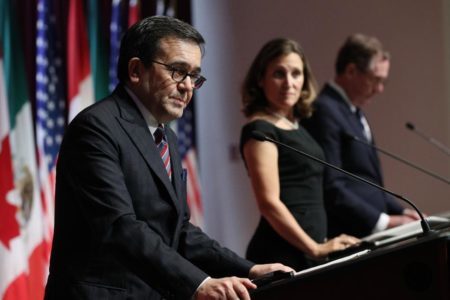Canadian representative fears the continuity of the Agreement hinges on politics and not on technical discussions…
WASHINGTON — Despite the harsh proposals which came out of the fourth round of talks to revamp the North American Free Trade Agreement (NAFTA) and the latent possibility of American President Donald Trump ending the agreement at any given moment, Canada and Mexico agree to continue the talks during the fifth round, to be held from October 29 to November 2.
The Mexican business sector claimed they will “double the efforts” during the lobbying before senators, representatives, governors and American entrepreneurs to “save” NAFTA, according to the coordinator of the Next-Door Room of the private initiative, Moisés Kalach.
“We’re still following plan A, saving this commercial instrument, which is why we need to keep calm and be responsible,” Kalach added.
However, he acknowledged there is a possibility of Trump deciding the U.S. to leave the Agreement. According to the Canadian representatives, the proposals the U.S. brought to the negotiating table during this fourth round are unacceptable for both, the U.S. and Mexico.
Moreover, they claim the technical discussions are being very polite, unlike the statements of the American President.
“The U.S. wants their proposals accepted, but they don’t accept Canada’s proposals on labor issues, they refuse to adopt labor commitments before the International Labour Organization (ILO),” said a source who has asked to remain anonymous.
The key issues for the American Team are the establishment of a sunset clause for NAFTA, to increase the rules of origin on the automotive
industry from 62.5% to 85%, the rejection of the current dispute-solving mechanism, and the increase of regional material on the textile
industry, as well as the implementation of several models which will damage the agricultural industry, which neither Mexico nor Canada will
accept, a source told El Universal.
Since the first round of talks, Canada talked about the importance of the gender and labor chapters. On this regard, they have proposed
recruitment frameworks allowing union freedom – according to the Convention 98 of the ILO – and to link salary policies to productivity,
which would lead to a wage increase.
For the Canadian negotiator, the NAFTA renegotiation is currently undergoing a critical moment, because the decisions will be dictated by
politicians and not by the technical discussions.
The fifth round of the NAFTA talks will take place in Mexico City, while the sixth will take place in Canada in mid-November. The seventh
and final round is scheduled for the early weeks of December, in the United States.
Source: eluniversal.com.mx


